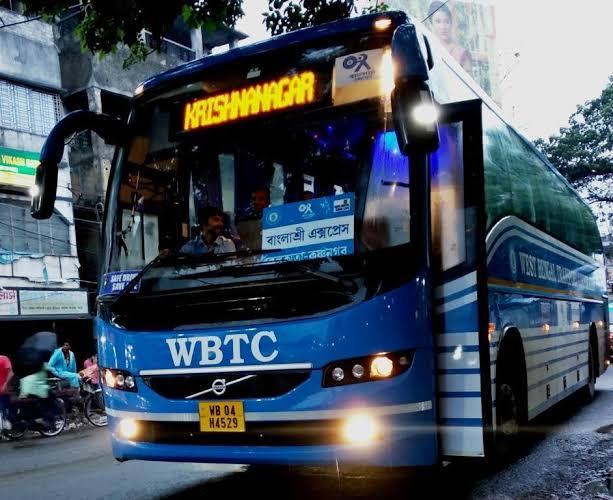WB: Both Private & Public Passenger Transport Sectors Struggling as Govt. Looks Towards Privatisation

WBTC Long distance AC Bus Banglasree Express. Representational Image. Image Courtesy: Wikimedia Commons
In this two-part series, we look at the condition of workers in the freight and passenger transport sectors in West Bengal. Each sector has faced losses since the pandemic, which has worsened by the ruling State government’s non-action and alleged corruption. In the first part, we look at the condition of truck and lorry drivers, while in the second, we focus on private and public taxis as well as buses in the state. This is the second part. The first part can be read here.
"Kolkata Metro and auto-rickshaws are at present the lifelines of the passenger transportation sector. Currently, 20,000 autos ply the Kolkata Municipal Corporation (KMC) area, most with valid permits. The number of auto and toto rickshaws in the state stands at around 1,00,000," said Ajit Choudhury of Kolkata Autorickshaw Operators' Federation.
Babai Dey, a 23-year-old auto-rickshaw driver who operates on the Shobha Bazar Ultadanga route, was more candid.
"We have to pay a batchit (a form of rent paid to the auto owner), which comes at about Rs 400-450/day. To make an extra Rs 250 after paying a batchit is a herculean task. There are days when we drive our autos for 12-14 hours and return home with Rs 100-150. This is because around 450 autos ply in the 3-km stretch from Ultodanga to Shobha Bazar. We have to compete with our fellow auto drivers for passengers."
Dey supports his parents with his income. His father, an ex-Bayers India employee, is without a job after 41 years of service. Dey graduated from Calcutta University and started driving an auto after he could not find another job in the city.
Another major issue the sector faces is the impending katai of the autos in the city, as most vehicles have been in service for more than 13 years.
The last time such an exercise was conducted in 2010, the Left Front government arranged for the autos to be converted into CNG vehicles. The auto operator paid Rs 10,000 to avail of the service. The public banks paid the rest at the rate of Rs 2,500/month for 60 months, with the government as the guarantor. Each auto has a life span of 15 years. Most autos currently plying in the state will complete that by 2024.
The current private finance mode has not been easy for auto operators. They are required to pay a monthly EMI of Rs 8,000 for 25 months. After the impending katai, it remains to be seen if the conversion will be as smooth as before. The auto operators are not very sanguine about it.
GOVERNMENT BUS SECTOR
The government bus sector and public buses in the state are in decline as the government plays truant to them. Contract employees in the sector make around Rs 6,000 to Rs 15,000 while they are made to do the same job as permanent workers.
The case of trams is worse as out of 257 available trams, only 16 currently run in the state. The situation is similar with buses; there are around 300 government buses, but only 120-130 are currently in operation.
"The shrinkages in operations have led to job losses. Recently, multiple drivers were laid off. The bus depot lands have been hived off to private parties or land mafias by the government. The money earned through these activities has not been infused in the corporations," alleged Subir Bose, a retired employee of West Bengal State Transport Corporation (WBSTC).
Contract work has meant that there have been job losses regularly. The state government is in the process of making a new deal to purchase 1,180 electric buses, which would be given to private parties with a minimum guarantee of running for 200 kilometres. The private bus owners are set to be paid a hefty sum to operate the buses against the guarantee.
"There are around 14,667 workers in the sector- 6,701 permanent and 7,966 contract workers. The total number of public buses in the state is 3,250, out of which 2,167 are in regular operation. Around 22/258 trans are currently plying on the road," Jiban Saha, leader of South Bengal State Transport Union (SBSTC), told NewsClick.
The state of permanent workers is also not good. They complain that they are receiving their DAs (Daily Allowance). At the same time, the contract workers complain that they have not received their due wages.
NewsClick also spoke to Dipak Mahato and Jayanata
Newsclick spoke with Dipak Mahato and Jayanata Kesh, two SBSTC drivers who were recently laid off. They decried their sacking from their respective jobs but said that as skilled drivers, they currently work in local private buses, making around Rs 500/day.
PRIVATE BUS INDUSTRY
Around 1,00,000 private buses are currently plying in the state. The private bus industry has its set of issues; the state government is curtailing routes. Many buses are not getting an adequate number of passengers. In many cases, the government allocates routes to new individuals.
Atanu Hui is a private bus driver who operates on the 45A route, which traverses from Garia to the airport in Kolkata.
"On average, a bus earns around Rs 2,500-3,500 from ticket sales daily. After adjusting diesel costs (around Rs 1,200/day), the conductor and the driver are left with Rs 600 each. During the festival period, ticket sales go up to Rs 4,500, which increases their daily earnings," Hui told NewsClick.
Rajib Biswal, a bus conductor in Raja Bazar, said there used to be a regular bonus of 8.33% during the festive season when the Left Front was in power.
"Nowadays, the bonus depends on the whims of the vehicle owner," he said.
"All the route committees have been forcibly taken over by the Trinamool Congress (TMC) through its trade union. The union has meekly surrendered to vehicle owners on every route," Biswal said.
However, in districts where left trade unions are active, the bus owners are forced to give a bonus to the bus workers of 8.33%.
OLA, UBER & Yellow TAXIS
The customary yellow taxi, the earlier king of Kolkata roads, is nearly invisible now, with most replaced by Ola and Uber cabs.
Ola and Uber drivers are strongly unionised under the guidance of the Centre of Indian Trade Unions (CITU). After forming their respective unions, Ola and Uber drivers recently received a major victory after the government the sudden switching off of the applications by the companies illegal. This used to cause time loss for the drivers.
Currently, there are around 7,000 yellow taxis and 10,000 app-based cabs in the city, per Indrajit Ghosh, from the cab drivers' union.
A yellow taxi driver makes around Rs 500, while app-based drivers also make around Rs 500-600 on average. The latter can increase their earnings to Rs 1,000 if they operate for more than 12 hours. Despite working long hours, none of the drivers is covered under any social security network, which the union has demanded.
"Due to wrong interference from the Central and state governments, the entire transport sector is an anarchical state and in complete disarray," said Subhas Mukhopadhyay, All India Transport Workers' Federation. He is also the President of the CITU West Bengal Committee.
The Central and state governments have decided against plying vehicles with subsidies, which is against the concept of a welfare state embedded in our constitution. Even though the government emphasises privatisation, private bus operators are also struggling. Some are even shutting down their business.
The government buses operate on many non-profitable routes to benefit common people in far-flung areas. These situations are not considered when the profitability of a government corporation is evaluated. There are 51 road transport corporations in the country; only five were profitable up to 2014. The state's route transport authorities (RTA) are a den of corruption for private bus owners. No work gets done without money. Our union demands to bring all workers under the social security network and an end to corruption in RTAs. We also oppose the draconian Motor Vehicles (Amendment) Act," Mukhopadhyay added.
Get the latest reports & analysis with people's perspective on Protests, movements & deep analytical videos, discussions of the current affairs in your Telegram app. Subscribe to NewsClick's Telegram channel & get Real-Time updates on stories, as they get published on our website.
























